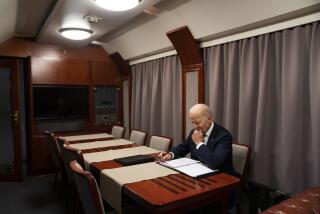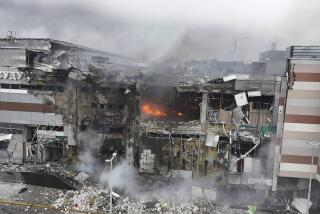A few final questions for Obama and Romney on foreign policy
One of the often-repeated observations about GOP presidential candidate Mitt Romney is that, when you get down to the specifics of foreign policy, there’s not much of a gap between him and President Obama. Instead, the differences are mainly in tone.
At Monday’s final debate between the two men, that bit of conventional wisdom may finally be put to the test. I say “may,” not “will,” because they’ve both been adept at sidestepping efforts to pin down their positions. The challenge for moderator Bob Schieffer of CBS is to push the candidates to translate gauzy rhetoric about leadership into specific policy choices, and to offer more meaningful critiques than the sort of 20-20 hindsight Romney has employed about embassy security.
Schieffer has laid out six general areas to explore, including Afghanistan/Pakistan, the prospect of an Iranian nuclear weapon and what Israel might do about it, “the changing Middle East and the new face of terrorism,” and China. But the topic that could draw out the clearest difference between the candidates is the one Schieffer calls “America’s role in the world.” Or, in a word, leadership.
Here are a few questions I hope Schieffer asks that could help viewers cut through the posturing to see how Obama and Romney might handle foreign-policy challenges in different ways:
Under what circumstances should the United States go it alone to advance its foreign-policy interests, as opposed to working in concert with its allies?
Russia and China have blocked or undermined a number of U.S. foreign-policy efforts, such as pressuring Iran to abandon its nuclear weapons program. What’s the right U.S. response to those two countries?
Does the United States’ image in the rest of the world matter, and if so, what’s the best way to enhance it?
Under what circumstances would you commit U.S. combat forces to intervene in an uprising such as the ones that have been occurring in the Middle East?
If Israel bombs Iranian nuclear facilities, how should the United States respond?
Both candidates have said they intend to withdraw combat forces from Afghanistan in 2014. What developments, if any, might delay that withdrawal?
Should there be a peace dividend with the end of wars in Iraq and Afghanistan, or should the United States maintain its defense spending at its pre-withdrawal level?
The administration has come under sustained criticism for its evolving explanation of the attack on the U.S. embassy in Benghazi, Libya. What should the administration have done differently, and what’s the lesson for how to comment on such incidents in the future?
What limits should there be on the use of Predator drone strikes outside the battlefield in Afghanistan?
What steps, if any, should the United States take to promote a better global response to climate change?
Finally, is China illegally manipulating the value of its currency? If so, what can the United States do about that without triggering a trade war, or giving other nations an excuse to brand the United States a currency manipulator based on the Federal Reserve’s efforts to bring down interest rates?
Those are my suggestions. Post yours to the comments field below!
ALSO:Too little too late in Libya
Endorsement: Obama for president
Photos: Six numbers to ignore from the presidential campaign
Follow Jon Healey on Twitter @jcahealey
More to Read
A cure for the common opinion
Get thought-provoking perspectives with our weekly newsletter.
You may occasionally receive promotional content from the Los Angeles Times.







